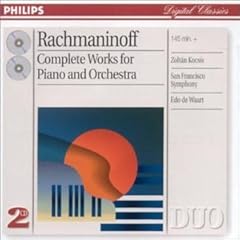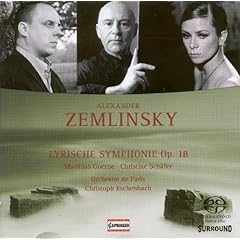I love it when recordings exceed expectations
Posted by: Todd A on 01 March 2010

I’ll confess to not being a big fan of Rachmaninoff. I enjoy a few works, and among the piano concertos I do have a soft spot for the second, and generally the mushier the reading, the happier I am. But every once in a while I try something new. This time it was the complete works for piano and orchestra with a young Zoltan Kocsis at the piano, paired with Edo de Waart and the San Francisco symphony in a cycle from the first half of the 80s. I’ve known about this cycle for years, of course, and now I’m wondering why I didn’t get around to it before. It’s easily my favorite set of these works.
For me the magic all comes from the hands of Kocsis. He approaches these works in an unabashedly virtuosic fashion, and that’s what makes everything sound so extraordinary. Dazzling, scintillating, dizzying, sparkling, transcendent: however one wants to describe the playing, it’s accurate. In each piece he plays with such ease and flair and energy as to make every other version of every work seem a bit soporific. Okay, okay, maybe the Second isn’t reduced to a pile of sonic mush like I like, but here that’s okay! The first, well, it dazzles. Hell, even the Fourth, long a concerto I haven’t cared about at all, comes off amazingly well. But for me the real treat is the Third. For the most part, I just plain old don’t like this piece. And this is with some of the biggest names at the keyboard and leading the orchestra. The work is all flash and no substance, a vacuous crowd pleaser. Well, Kocsis really delivers. No, he can’t make this a truly profound work, but his extremely fast, light, limber playing, with de Waart and company doing their best to keep up, makes the work more fun, more energetic, and more pleasing than normal. But Kocsis is more than fast and agile. He’s incredibly sensitive, too. His playing, even when blazing fast, displays a tonal variety and dynamic sensitivity that is much more than impressive. It’s almost super-human.
I wasn’t really surprised that I liked this set as much as I did. The reissued Kocsis Rachmaninoff recital from a couple years ago was an ear opener, so I had high expectations for this set. Said expectations were stomped on. Only somewhat dull and veiled early digital sound hamper an otherwise staggering set. Now, keep in mind that I’m a relative Rachmaninoff newbie, not having heard more than maybe ten or so versions of any of the works. That written, I’d be surprised if ever I hear a better set. One of my purchases of the year.

For years I’ve been relying on James Conlon’s excellent rendition of Alexander von Zemlinsky’s fine Lyric Symphony, with Soile Isokoski and Bo Skovhus the singers. Conlon recorded quite a bit of Zemlinsky for EMI, all of it very good or better – his recording of Der Traumgörge is sublime, for instance – but surely such fine music deserves multiple interpretations. Well, a few years back, Christoph Eschenbach recorded the work with the estimable pair of Matthias Goerne and Christine Schäfer, along with the Orchestre de Paris, for Capriccio. I’ve dillied and dallied, but now I’ve heard the recording, and it’s a doozy.
First of all let me confess that I adore Ms Schäfer. She’s the reason I wanted this recording. So it’s not surprising that I love her singing on this recording. It’s beautiful and works well in the sumptuous setting. Perhaps Isokoski can belt out the tunes more forcefully, but I’ll take Ms Schäfer. She’s just so easy to listen to. Matthias Goerne also does an extremely fine job. His tone is rich and his delivery strong and nuanced. He definitely beats out Mr Skovhus for me. In terms of orchestral playing, both bands are about even, and in terms of conducting both Conlon and Eschenbach offer compelling visions. Eschenbach’s is the lusher of the two, which really works well with this composer, though Conlon’s more precise, it seems. Call it a draw.
Sound is a mixed bag in both cases. For Conlon there is a hard edge at time. For Eschenbach the balance is off. Through speakers the orchestra is too distant and the voices too prominent, and there is a bit of a veil. Through headphones everything is better balanced. Pity, because such a large work deserves a large presentation. Anyway, taken as a whole, this is an extraordinary recording and one that more than lives up to my expectations.
